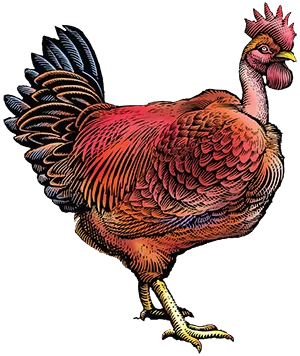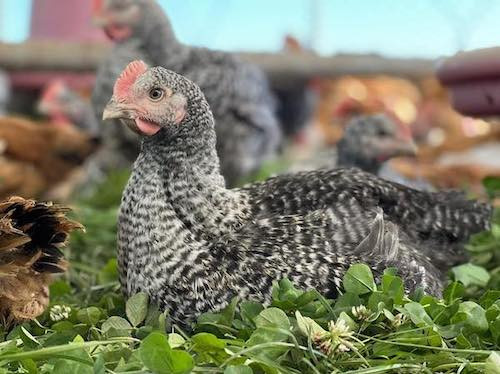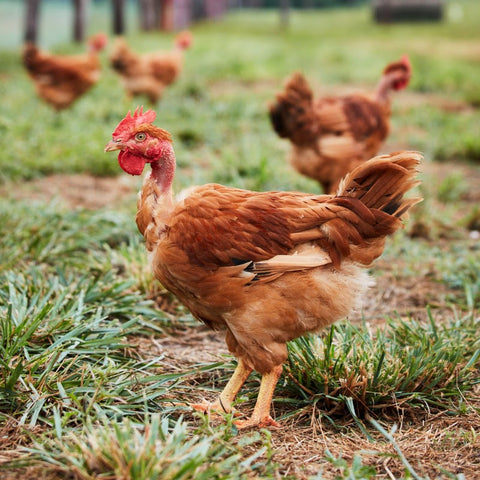
Sourcing Heritage Poultry: Building a Resilient Homestead Through Ethical Consumption
Hey there, fellow homesteaders! We all know that building a self-sufficient life is a journey, and every step, from planting your first seed to raising your own livestock, is an opportunity to align your actions with your values. That includes how you shop. I'll never forget the first time I tasted a truly farm-fresh chicken – the kind my grandma used to raise. The depth of flavor, the richer color, the texture… it was a world apart from anything I'd ever bought at the grocery store. It sparked a passion for heritage breeds and a desire to source my food intentionally. In this post, we’re diving deep into the art of intentional shopping for the homestead – focusing on one crucial area: heritage poultry. We're not just saving money, but also supporting sustainability, community, and the practices you believe in.

By intentionally sourcing heritage poultry, homesteaders can contribute to biodiversity, support ethical farming, improve the quality of their food, and build a more resilient homestead.
Why Choose Heritage Poultry? (Beyond the Egg)
It's easy to grab a pack of chicken breasts at the supermarket, but what are you really getting? Heritage poultry offers so much more than just a quick meal. It's an investment in your health, the environment, and the future of agriculture.
Flavor and Nutritional Value: Let's be honest, most commercially raised chicken tastes… well, bland. Heritage breeds, on the other hand, boast a richer, more complex flavor. Their meat is often more succulent and less watery, and they generally have a higher fat content, which contributes to both flavor and moisture. A closer look at the nutrient profile reveals that heritage poultry can also be richer in certain vitamins and minerals compared to their commercially raised counterparts. The difference is substantial.
Biodiversity and Conservation: Did you know that many heritage poultry breeds are facing extinction? These breeds represent a valuable genetic resource, and their loss would be a blow to agricultural biodiversity. When you support farmers who raise heritage breeds, you're helping to preserve these unique genetic traits and ensuring that future generations can enjoy the benefits of a diverse poultry population. This diversity is vital; it makes our food supply more resilient to disease and better equipped to adapt to changing climates.
Environmental Sustainability: Unlike commercial breeds that are often confined to indoor facilities and rely heavily on grain-based diets, heritage breeds are typically better suited to foraging. They can supplement their diet with insects, grasses, and other natural foods, which reduces their reliance on commercially produced feed and lowers their environmental impact. Many farmers who raise heritage poultry also practice rotational grazing, which helps to improve soil health and reduce the need for fertilizers.
Ethical Considerations: The welfare of animals is a growing concern for many consumers, and for good reason. Industrial chicken farming often involves crowded conditions, limited access to the outdoors, and a lack of natural behaviors. Farmers who raise heritage breeds typically provide their birds with more space, access to fresh air and sunlight, and the opportunity to engage in natural behaviors like foraging and dust bathing. You can feel good about supporting farmers who prioritize animal welfare.
Homestead Appropriateness: For homesteaders, heritage breeds offer several advantages. Many are dual-purpose, meaning they're good for both meat and egg production. They're also often hardier and more resistant to disease than commercial breeds, making them a good choice for homesteaders who want to raise their own poultry in a natural and sustainable way. Different breeds excel in different climates, so finding one for your region is a great boon.

Key Takeaways: Heritage poultry offers superior flavor and nutrition, supports biodiversity and sustainable agriculture, and promotes ethical animal treatment, making them a valuable asset to the homestead.
Finding Ethical and Sustainable Sources
So, you're convinced that heritage poultry is the way to go. Now, how do you find it? It's all about being intentional and asking the right questions.
Local Farms and Farmers Markets: The best place to start is your local farmers market. Talking directly to the farmer allows you to learn about their practices firsthand and build a relationship with the person who's raising your food. Plus, you're supporting your local economy and reducing food miles – the distance your food travels from farm to table.
Questions to Ask Farmers: Don't be afraid to ask questions! Here are a few to get you started:
- What breed of poultry do you raise, and why did you choose it?
- What do you feed your poultry? Is it locally sourced and GMO-free?
- How much space do your poultry have? Do they have access to the outdoors?
- How are your poultry processed? Is it done on-farm or at a local facility?
- Do you use antibiotics or other medications on your poultry? If so, under what circumstances?
Online Marketplaces and Co-ops: If you don't have access to local farms or farmers markets, consider online marketplaces or co-ops that specialize in ethically raised heritage poultry. Do your research to ensure that the marketplace or co-op has high standards for its producers and that the poultry is raised in a sustainable and humane way.
Regenerative Agriculture Practices: Look for farmers who are using regenerative agriculture practices. This means that they're not just minimizing their environmental impact, but actively working to improve soil health, sequester carbon, and enhance biodiversity. In the context of poultry farming, regenerative practices might include rotational grazing, cover cropping, and composting.
Certification Programs: While not a perfect guarantee, certification programs can provide some assurance that the poultry you're buying meets certain standards for animal welfare and sustainability. Look for certifications like Animal Welfare Approved or Certified Humane.

Key Takeaways: Intentional sourcing involves choosing local farms, asking informed questions, and looking for certifications that guarantee ethical and sustainable poultry-raising practices.
Making the Most of Your Purchase (From Whole Bird to Broth)
You've found a source for ethically raised heritage poultry. Now, it's time to make the most of your purchase.
Buying Whole vs. Parts: Buying a whole bird is generally more cost-effective than buying individual parts. Plus, it allows you to use all parts of the bird, from the breast meat to the bones.
Proper Storage and Handling: Store raw poultry in the refrigerator at a temperature of 40°F (4°C) or below. Use it within 1-2 days, or freeze it for longer storage. Be sure to wash your hands thoroughly after handling raw poultry to prevent the spread of bacteria.
Creative Cooking Techniques: Heritage poultry is often leaner than commercial chicken, so it's important to use cooking methods that will keep it moist and tender. Roasting, braising, and grilling are all good options. Experiment with different herbs, spices, and marinades to enhance the flavor of the meat.
Using the Whole Bird: Don't let anything go to waste! Use the carcass to make a rich and flavorful stock. Render the fat and use it for cooking. Even the bones can be used to make bone broth, which is rich in collagen and other nutrients.
Key Takeaways: Maximize your investment by buying whole birds, practicing safe handling, exploring diverse cooking techniques, and utilizing every part of the bird to reduce waste.
Overcoming Challenges and Addressing Beginner Concerns
Sourcing heritage poultry isn't always easy. Here are some common challenges and how to overcome them:
Cost Considerations: Heritage poultry can be more expensive than commercial chicken. Ways to make it more affordable include buying in bulk, sharing a purchase with friends or neighbors, or raising your own poultry.
Availability and Accessibility: Heritage breeds may not be readily available in all areas. Check with local farmers markets, online marketplaces, and heritage poultry breeders to find sources in your area.
Processing Challenges: Processing your own poultry can be daunting, especially for beginners. If you're not comfortable doing it yourself, look for local processors who specialize in poultry.
Starting Small: If you're new to raising poultry, start with a small flock or a few birds to gain experience. Don't be afraid to ask for help from experienced homesteaders or poultry farmers.
Key Takeaways: Address common challenges and provide solutions to make heritage poultry accessible and manageable for homesteaders of all levels.
A Taste of the Future
Sourcing heritage poultry is more than just a shopping decision; it's a commitment to a better future. By supporting farmers who raise these unique breeds in a sustainable and humane way, you're contributing to biodiversity, protecting the environment, and improving the quality of your food.
Now, I challenge you to make one intentional shopping decision this week. Visit your local farmers market and talk to a poultry farmer. Research a heritage breed that’s suited to your climate. Or simply commit to buying a whole chicken instead of individual parts. Small changes can make a big difference. What is one shopping habit you changed to be more in line with your values? Share it in the comments below! Let's build a future where heritage poultry thrives and sustainable agriculture is the norm – one delicious, ethical bite at a time.